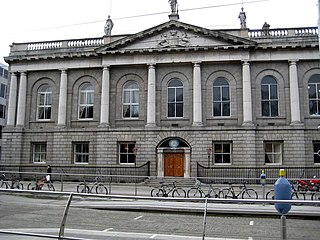
Abraham Colles was Professor of Anatomy, Surgery and Physiology at the Royal College of Surgeons in Ireland (RCSI) and the President of RCSI in 1802 and 1830. A prestigious Colles Medal & Travelling Fellowship in Surgery is awarded competitively annually to an Irish surgical trainee embarking on higher specialist training abroad before returning to establish practice in Ireland.

The Royal College of Surgeons in Ireland (RCSI) is a not-for-profit medical professional and educational institution, which is also known as RCSI University of Medicine and Health Sciences. It was established in 1784 as the national body for the surgical branch of medicine in Ireland, with a role in supervision of training, and as of 2021 provides a broad range of medical education in multiple countries.

Robert Adams was an Irish surgeon and was three times President of the Royal College of Surgeons in Ireland (RCSI), in 1840, 1860 and 1867.

William Dease (1752?–1798) was an Irish surgeon and anatomist. He was one of the founders of the Royal College of Surgeons in Ireland and its first Professor of Surgery. He studied surgery in Dublin and Paris and was appointed surgeon to the United Hospitals of St Nicholas and St Catherine.

Sir Philip Crampton, 1st Baronet, FRS was an eminent Irish surgeon and anatomist. He was President of the Royal College of Surgeons in Ireland (RCSI) in 1811, 1820, 1844 and 1855.
Richard Carmichael MRCSI MRIA was an eminent Irish surgeon, medical writer and philanthropist.
Robert William Smith MD FRCSI MRIA was an Irish surgeon and pathologist who described Smith's fracture in his 1847 book, the first important book on fractures by an Irish author.

Solomon Richards was an Irish surgeon who served four terms as president of the Royal College of Surgeons in Ireland (RCSI) in 1794, 1803, 1808, and 1818. He achieved fame by performing a tracheotomy in public for which act he featured in a satirical poem in The Metropolis. He was praised for his philanthropy and noted for his puns and bon mots. He was said to be the "fattest surgeon in the United Kingdom".

Gustavus Hume was the president of the Royal College of Surgeons in Ireland (RCSI) in the first part of 1795. He specialised in the diseases of children. He was one of the surgeons who examined the body of the journalist William Jackson after he died from poisoning in a Dublin court in 1795 while awaiting sentencing for high treason.

Richard Dease was the president of the Royal College of Surgeons in Ireland (RCSI) in 1809.

Samuel Wilmot MD MRCSI was the president of the Royal College of Surgeons in Ireland (RCSI) in 1815, 1832 and 1846.

Charles Hawkes Todd was a medical doctor and the president of the Royal College of Surgeons in Ireland (RCSI) in 1821.

John Timothy Kirby was the president of the Royal College of Surgeons in Ireland (RCSI) in 1823 and 1834.

William Auchinleck was the president of the Royal College of Surgeons in Ireland (RCSI) in 1829.

Thomas Edward Beatty was an Irish physician, and the president of the Royal College of Surgeons in Ireland (RCSI) in 1850.

Thomas Rumley was the president of the Royal College of Surgeons in Ireland (RCSI) in 1841.

William Henry Porter was President of the Royal College of Surgeons in Ireland (RCSI) in 1838.

Francis White was the president of the Royal College of Surgeons in Ireland (RCSI) in 1836.

Andrew Ellis was the president of the Royal College of Surgeons in Ireland (RCSI) in 1849.

Robert Harrison M.R.C.S. I., M.R.I.A. was an Irish surgeon and anatomist. He was the president of the Royal College of Surgeons in Ireland (RCSI) in 1848.






